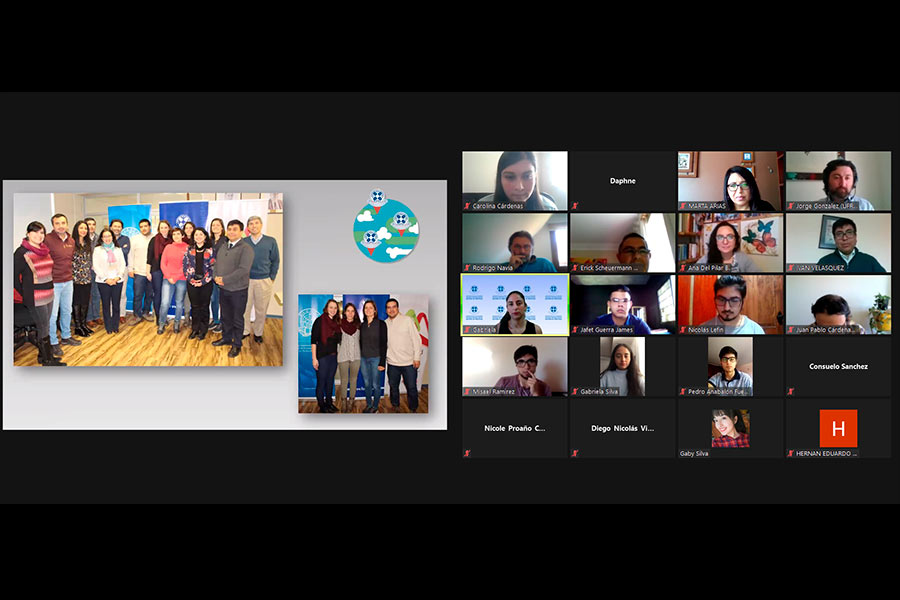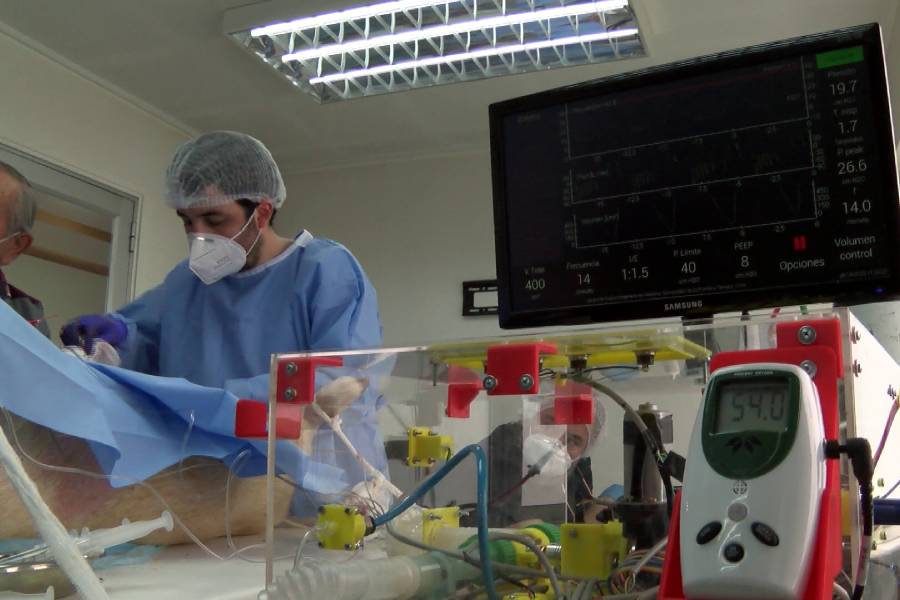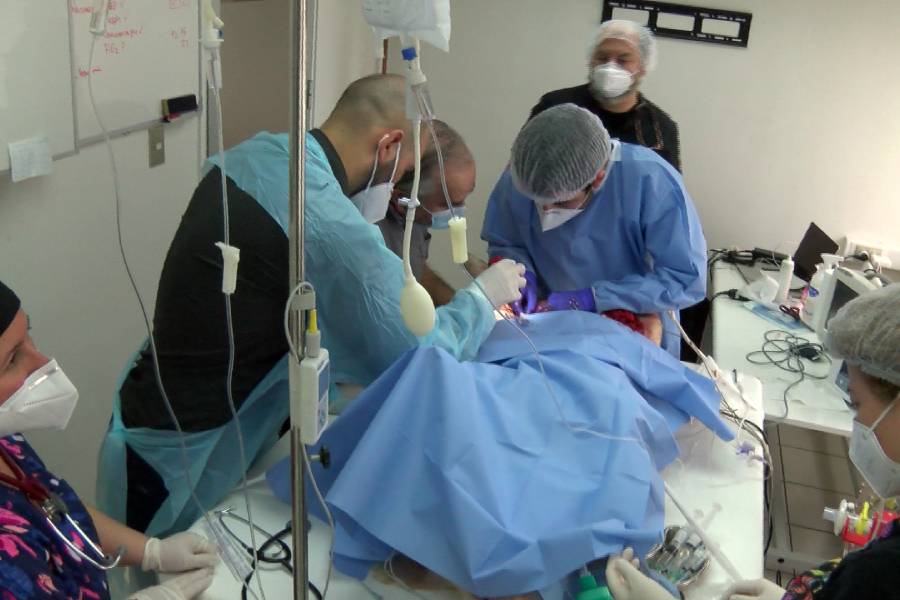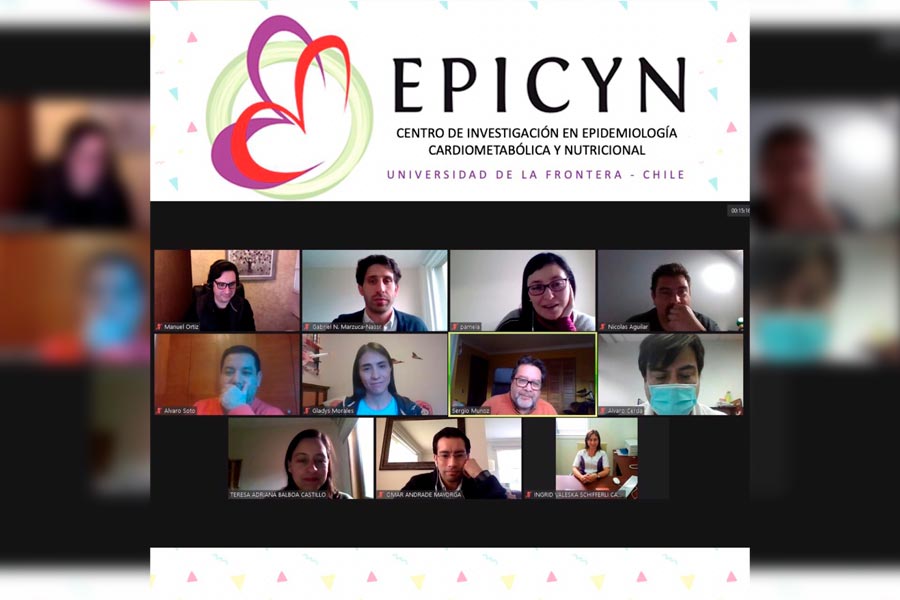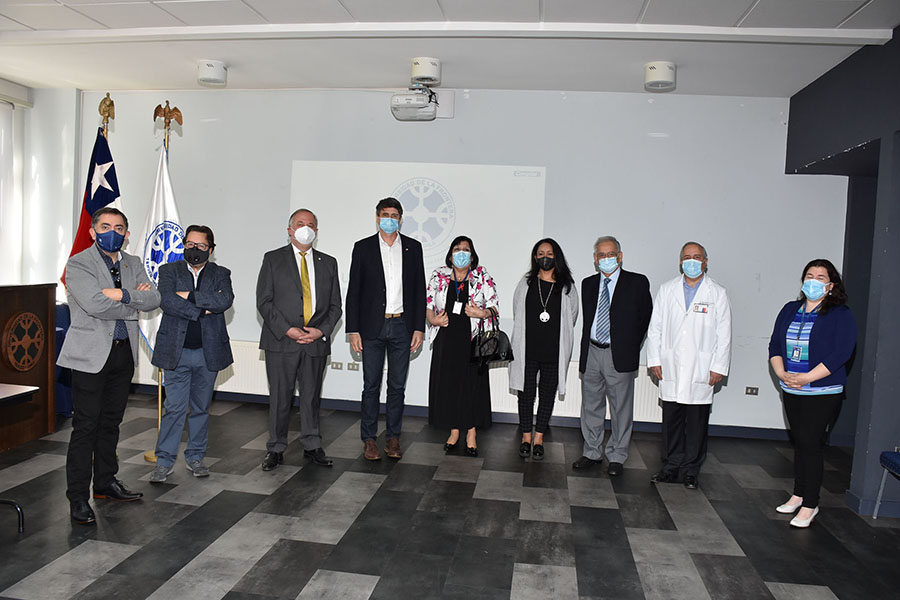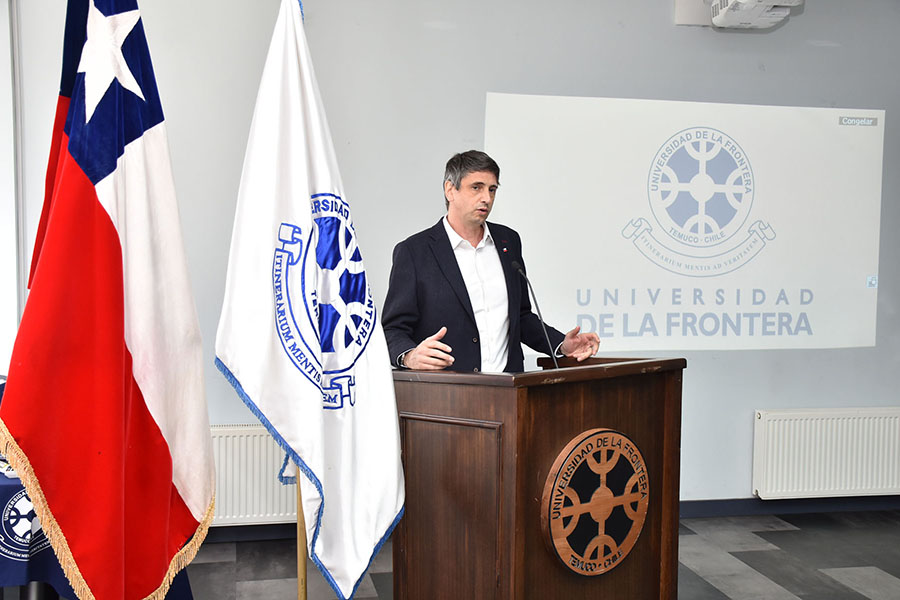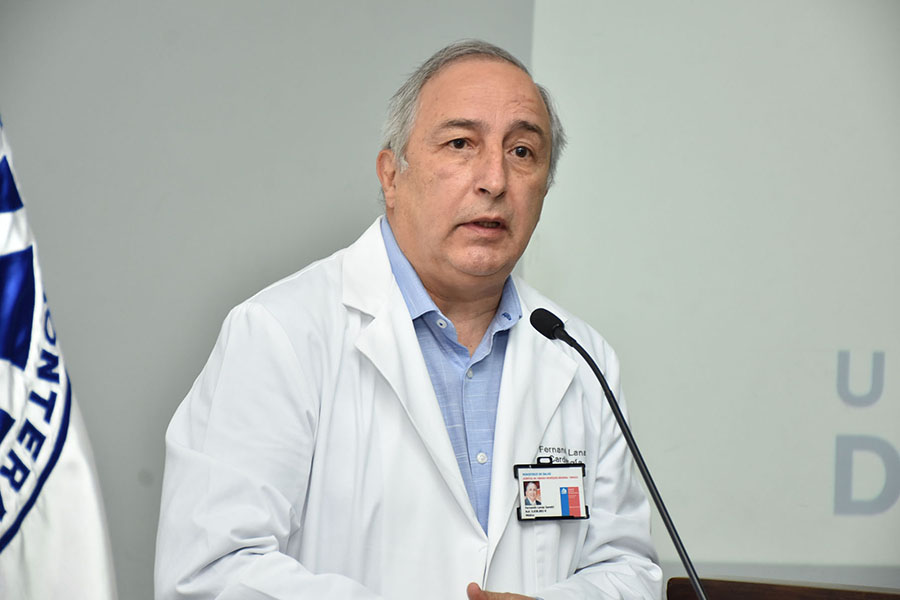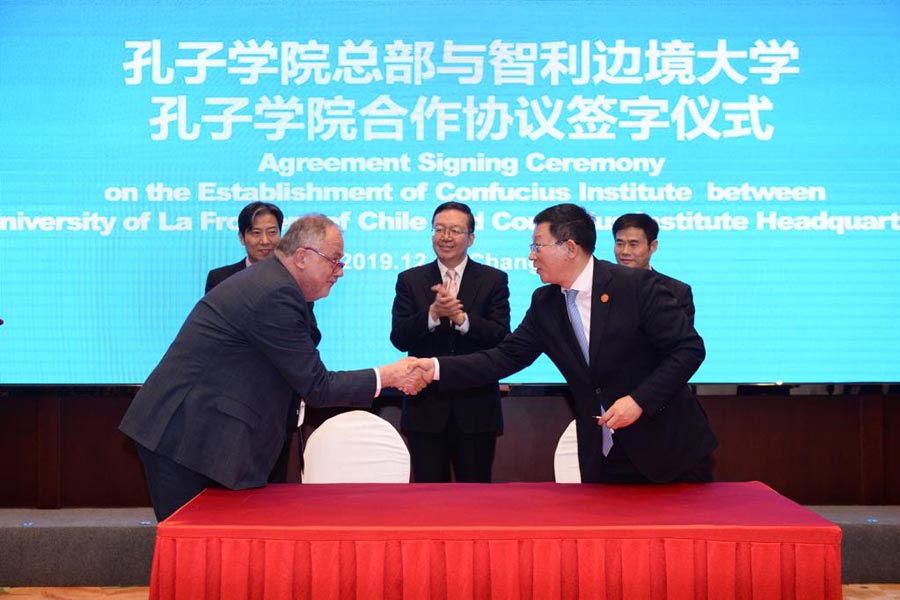|
The Faculty of Engineering and Science (FICA) of UFRO organized a relaxed virtual meeting with students who participated in the FICA IAESTE internship program 2020 for practical training abroad, in order to share their experiences. |
With the participation of authorities and academic staff members of the university Universidad de La Frontera (UFRO), employers, and representatives of the International Association for the Exchange of Students for Technical Experience (IAESTE), the students shared their international mobility experience in a meeting that had to take place online this time, because of the pandemic caused by COVID-19. The students who participated are José Guerra and Karolyne Díaz from Panama; Gabriela Silva and Nicole Proano from Ecuador; Diego Villagrán and Hernán Cid, two Computer Engineering students from UFRO; Pedro Anabalón and Nicolás Lefin, Chemical Engineering students from UFRO; and Misael Ramírez, who studies Civil Engineering in Computer Science at UFRO. “These foreign and national students make it possible for us to continue with the FICA IAESTE Program, which is an interesting program for internships and practical training abroad. It benefits everyone involved, because it allows us to receive a certain number of students from other parts of the world at our university and gives us the opportunity to send the same number of our students to other parts of the world for their internships,” Dr. Rodrigo Navia, the dean of the Faculty of Engineering and Science, pointed out. In response to the pandemic and in order to continue with the program, a new modality of virtual internships was introduced in May 2020. According to Carolina Cárdenas, the person in charge of IAESTE Chile, “the different countries that are members of IAESTE believe that this modality is a great opportunity for international cooperation from home. Thanks to this modification, UFRO students became the opportunity to carry out international internships with employers from different countries, such as the Czech Republic, Colombia, Brazil and India. However, we hope that it will be possible for our students to carry out their internships on-site again this year”. FICA IAESTE has also been able to offer different virtual internships for foreign students, through academics of the Universidad de La Frontera, during 2020. IMPRESSIONS Gabriela Silva, an Architecture student at the ‘University of San Francisco’ in Quito, Ecuador, describes her virtual internship experience with Dr. Juan Pablo Cardenas of the UFRO Department of Civil Engineering as positive. “There are subjects I did not have at my university and I feel that I have learned much more with Dr. Cardenas. You could probably say that the construction methods are a little more basic in my country, because we only have two seasons, winter and summer, while Chile has four seasons, what means that you have to work differently. Besides of the learning process, Dr. Cardenas has been quite supportive and also allowed me to participate in his classes.” Diego Villagrán, a Computer Engineering student at UFRO, is a real fan of the FICA IAESTE Program. “Thanks to this program, I had the opportunity to carry out two internships abroad. The first one was in Brazil in 2019 and the second one in the Czech Republic, which started in February of 2020 and had to take place under the virtual modality because of the pandemic. I am still working with them in this modality and I am very satisfied. You can learn a lot, as long as you know how to make the most of it,” he explained. This way, the Universidad de La Frontera, through its Faculty of Engineering and Science and the Student Mobility Office, has been able to continue with the coordination of internships abroad for its students during a very complex year 2020, thanks to an alliance established with the International Association for the Exchange of Students for Technical Experience (IAESTE) in 2017, a cooperation initiative, which at UFRO is coordinated by Gabriela Reyes. Written by: Daphne Bormann |
|
Since late March, a multidisciplinary team of physicians and engineers of UFRO has been working on the development of a mechanical ventilator, as a support in case of a possible lack of this kind of medical devices, due to the pandemic caused by COVID-19. |
This prototype of a mechanical ventilator has been developed by a team of experts from the Composite Materials Laboratory, which is directed by Dr. Renato Hunter, and the Center of Medical Physics and Engineering (CFIM), directed by Dr. Rodolfo Figueroa, of the university Universidad de La Frontera (UFRO), where also the experimental protocol was carried out, which is a crucial stage in the development process. The aim of this initiative is to support health professionals during this worldwide health crisis caused by COVID-19. The activity was chaired by Dr. Renato Hunter, the Vice-Rector for Academic Affairs, who pointed out that the development of this high-performance mechanical ventilator, which is very similar to the ones being used today in intensive care units, is a major milestone, since it will allow those establishments that do not have this kind of device, yet, to purchase it, because of its low cost. “There is no doubt about the impact of this achievement on the regional community. It will allow us to provide the health care service with this kind of equipment and if we manage to successfully complete the different procedures for the approbation of this mechanical ventilator, we will be able to provide it for the establishments that require it and to contribute to the current needs. This would allow us to avoid the lack of resources in our health care system, as we can experience it in our different care services at the regional level, and, therefore, help the community by contributing to the technological development of these devices with a national impact,” Dr. Hunter pointed out. During these months, the team, composed of doctors and engineers of UFRO, focused on developing a functional and efficient low-cost equipment with components that are available on the national market, and that complies with the international (WHO) and national (SOCHIMI) standards and requirements. One of the collaborators and advisors in this process was Dr. Waldo Merino, an academic of the UFRO Surgery, Traumatology and Anesthesiology Department, who made it possible to correctly pass the different validation tests. SUCCESSFUL PROTOCOL APPLICATION The application of the protocol was carried out and transmitted via streaming from the laboratories of the Universidad de La Frontera, a process that was declared successful in terms of the time and results expected by the team. The mechanical ventilator prototype uses a pneumatic solenoid valve that allows the medical gas (a mixture of medical air and O2) to flow to the patient, in addition to flow sensors in order to control the volume administered. The prototype can operate in four different ventilation modes, detecting the patient's inspiratory efforts in order to provide only the required volume. At the same time, this mechanical ventilator has a sophisticated electronic system and an alarm system that is connected to the monitor and provides the required information for a successful ventilation. It is worth mentioning that this achievement could be reached in collaboration with other local establishments. In this context, Mr. Waldo Merino commented that “we have great support for this project, in terms of infrastructure, human and physical resources, supplies and technological support, provided by the clinic ‘Clínica Alemana’ in Temuco. Another important support were our peers of the program in Veterinary Medicine from the university ‘Universidad Católica’ in Temuco (UCT), who have been able to join this project thanks to the constant support of Dr. Carlos Lüders, the Vice-Rector for Research at UCT. They were a great support, since without them we would not have been able to successfully complete the required tests in animal models”. Over the next few months, the team will continue with the improvement of the device’s functions, in order to reach perfection and to get the official certification by CERTIMED (a process carried out by the University of Valparaiso, Chile), which is required for all mechanical ventilators manufactured in Chile during this health crisis.
Written by: Vice-Rectorate for Academic Affairs, UFRO
|
|
350 national and international health professionals were trained in course with multidisciplinary approach to COVID-19 |
The course ‘A multidisciplinary approach to COVID-19 for health professionals’ was organized by the Research Center for Cardiovascular and Nutritional Epidemiology of UFROs Faculty of Medicine. The course was directed by Teresa Balboa and Gladys Morales, academics of the Research Center for Cardiovascular and Nutritional Epidemiology (EPICYN) and the Public Health Department of the university Universidad de La Frontera (UFRO). It took place from September to November, with the participation of national and international speakers and 350 health professionals from different parts of Chile and Latin America. According to Teresa Balboa and Gladys Morales, it is important to the EPICYN Research Center to contribute to the continuous training of health professionals with updated knowledge for the management of the new disease COVID-19. SPEAKERS The course was held by several national and international speakers: María Josefina Escobar (Adolfo Ibáñez University, Chile), Esteban Hebel (Araucanía Sur Health Service, Chile), Claudio Bravo (University of Washington Medical Center, Seattle, USA), Manuel Ortiz (Department of Psychology, UFRO), Nicolás Aguilar (Department of Physical Education, UFRO), Álvaro Cerda (Department of Basic Sciences, UFRO), Gabriel Marzuca and Fernando Lanas (Department of Internal Medicine, UFRO), Gladys Morales, Teresa Balboa and Ingrid Schifferli (Public Health Department, UFRO). They addressed topics such as the epidemiology of the pandemic, laboratory equipment, behavioral and mental health, physical activity, muscle atrophy in critically ill patients, diet and obesity, cardiovascular manifestations, pollution and Covid, and telemedicine in the context of a pandemic. PLATFORM “The course was carried out both synchronous via Zoom and asynchronous through the platform www.mooc.ufro.cl. This way, the participants were able to review the classes again. The course ended on November 30 and the participants who fulfilled the requirements obtained a certificate of 20 credited hours of work,” Gladys Morales explained. “We are dealing with a new disease and we want to help by presenting the most relevant scientific evidence in the different fields in order to train our health professionals,” Teresa Balboa pointed out.
Escrito por: Fabián Aguirre Silva
UFRO Faculty of Medicine |
Minister of Science visited UFRO and stressed the leadership in clinical trials for Covid-19 vaccine
|
The Minister Andrés Couve met with the university authorities and researchers who are leading the clinical trial for CanSino Biologics’ Covid-19 vaccine. |
“This clinical trial for a vaccine is one more example that it is possible to work on scientific discoveries for Chile and the world on the regional level in a rather centralized country such as Chile,” Andrés Couve, the Chilean Minister of Science, Technology, Knowledge and Innovation, pointed out during his visit at the university Universidad de La Frontera (UFRO), which is the only institution in phase III of the clinical trial for CanSino Biologics’ Covid-19 vaccine. The purpose of this meeting was to get to know the details of this clinical trial. Therefore, the Minister Andrés Couve met with authorities of UFRO and the regional government, with the academic staff that coordinates the study and with volunteers who have decided to be part of it. Some of the attendees were the Rector, Dr. Eduardo Hebel; the regional Health Minister, Dr. Gloria Rodríguez; the Vice-rector of Research and Graduate Studies, Dr. César Arriagada; the Dean of the Faculty of Medicine, Dr. Wilfried Diener; the Research Director, Dr. Pamela Serón; and Dr. Fernando Lanas, the researcher who is leading this study together with Dr. Sergio Muñoz, both of UFROs Faculty of Medicine. According to Dr. Eduardo Hebel, because of the impact of this pandemic, the whole world is watching and waiting for the results of these clinical trials for a vaccine that will help to protect the world population. In this context, he stressed that “we are very proud that our university in the south of Chile has been chosen to lead this study, which can benefit people in the whole world. This certainly is a recognition of our scientific work”. In this context, the Minister pointed out that “the regional institutions offer different opportunities and we have to combine all advantages in order to create the best service for our country, and we believe that regional research should be developed with this in mind”. He also explained that after the approval by the regulatory authorities, “these vaccines will meet the highest safety and efficacy criteria, so that the people do not have to worry. We need to be vaccinated as a society. Immunization is not an individual issue, we all have to play our part in the fight against this virus and to protect each other”. Dr. Fernando Lanas also stressed the fact that Chile is part of these major global studies and that a Chilean regional university is coordinating one of them. “This is a tremendous contribution in terms of our research capabilities and our scientific output. This is the only study led by a regional university, and a challenge and source of pride for us,” he said. The researcher explained that this vaccine uses an adenovirus that cannot replicate and that carries the coronavirus protein on its surface. The results of phase I and II have already been published and show that it is a safe vaccine, with a good immune response, and now it’s time for the international clinical trials, with more than 40 thousand participants from China, Canada, Russia, Mexico, Argentina and Chile. Chile started the process, which will take about a month a half, with 5200 volunteers from different cities like Santiago, Talcahuano, Valdivia, Osorno, Temuco and Puerto Montt. In Temuco, most of them are health professionals, with about 1400 doses being administered. One of them is Denissa Klagges, a speech therapist and epidemiologist, who explained that “my motivation for participating in this clinical trial is that I work at a clinic, where I deal with patients with Covid-19 sequels, who are having difficulties to speak, communicate and swallow”. Written by: Karimme Riadi Millas
Vice-rectorate for Research and Graduate Studies |
|
The Institution from Asia arrives in the La Araucanía Region, with the goal of teaching Chinese language and culture, while promoting the development of academic projects and strengthening the networks between the People's Republic of China and Chile. |
This week, the university Universidad de La Frontera (UFRO) inaugurated its Confucius Institute, in order to disseminate and promote the Chinese language and culture at the university and in Chile, as well as to create a connection between the People's Republic of China and the La Araucanía Region. It is worth mentioning that the inauguration ceremony was transmitted online, simultaneously in Chile (9 a.m.) and China (8 p.m.). The Confucius Institute UFRO is a unit that will be part of the Office of Outreach and Community Engagement. It is the third Confucius Institute in Chile and the only one in the south of Chile, forming part of the more than 500 institutes of the network that is present in 180 countries. According to Dr. Eduardo Hebel Weiss, the Rector of UFRO, the inauguration of the Confucius Institute at UFRO is a milestone with great relevance, both for the university and the country, since Chile’s “ties with China have been strengthened over the past years. Chile has approached the Asian country in a strategic way, to establish both economic and cultural alliances. And as a university, we are part of these alliances. We have made important connections with universities in China during the past 6 years and I am grateful for the trust placed in us by the Chinese Embassy in Chile, the Chinese International Education Foundation and our colleagues and friends at Communication University of China, because without their support, this accomplishment and inauguration would not have been possible”. The President of Communication University of China (CUC), Dr. Liao Xiangzhong, pointed out that “our universities will be working together and we will provide our most sophisticated resources available in the teaching process of the Chinese language, including our professors, in order to meet the expectations. At the same time, the Confucius Institute will also become an important platform for academic cooperation and cultural exchange between the two countries. So let us begin with communication through language, to improve our mutual understanding. With the inauguration of this Confucius Institute, we are expanding our collaborations and building another bridge for cultural exchange between China and Chile”. The Vice President and Secretary-General of Chinese International Education Foundation, Zhao Lingshan, explained that “Chile was the first country in Latin America that established diplomatic relations with China and on December 15, we will celebrate 50 years of diplomatic relations between the People’s Republic of China and Chile. The inauguration of the Confucius Institute at Universidad de La Frontera at this special moment does not only provide fresh impulses for educational exchange and our mutual collaboration, but also is another important symbol of the partnership between both countries and its development over the last 50 years of diplomatic relations. The Confucius Institute is a place where our Chilean friends can learn about Chinese culture and which offers a variety of language courses, what allows us to communicate and to build a deeper connection between China and Chile”. CONFUCIUS INSTITUTE UFRO The Confucius Institute at Universidad de La Frontera is the result of an alliance established in 2019 by UFRO and the Chinese International Education Foundation, which is connected with the institutes that are present in 180 countries around the world and which is supported by the Ministry of Education of the People's Republic of China and the Communication University of China. The Confucius Institute UFRO will be led by Dr. Paola Olave Müller, the director of the Office of Outreach and Community Engagement. According to her, “the establishment of this institute in our region can be seen as a bride between both countries and a great cultural and developmental contribution for the people in the south of Chile. We will work with the original principles of Confucius and establish a multicultural space for the Chinese community in the south of Chile”. One of the Institute’s first activities is an online concert with traditional music from China, performed by the Chinese Orchestra of China National Opera & Dance Drama Theater, which will be organized by the Embassy of the People's Republic of China in Chile together with China’s Ministry of Culture and Tourism, within the celebrations of 50 years of diplomatic relations between the People’s Republic of China and Chile. Click here to watch the Inauguration Ceremony Written by: María Carolina Oyarzún |





